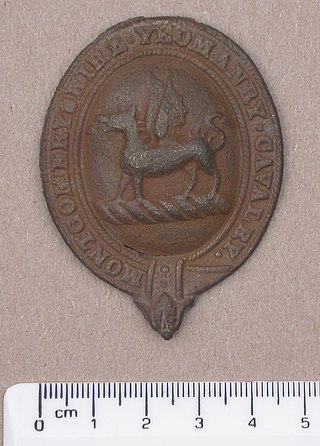
The Montgomeryshire Yeomanry was a Welsh auxiliary unit of the British Army first formed in 1803. It served in home defence and for internal security, including deployments to deal with Chartist disturbances in the 1830s. It provided volunteers to the Imperial Yeomanry during the Second Boer War and formed three regiments for service during World War I. It was broken up and converted to infantry and artillery in 1920.
Grandage Edwards Powell was an Anglican bishop in the second quarter of the 20th century.

John Saunders Gilliat was a British banker and Conservative politician.

James Atlay was an English churchman, Bishop of Hereford from 1868 to 1894.
The Gipsies Football Club was a short lived 19th century rugby football club that was notable for being one of the twenty-one founding members of the Rugby Football Union, as well as producing a number of international players in the sport's early international fixtures.
Ravenscourt Park was a short lived 19th century English rugby union club that was notable for being one of the twenty-one founding members of the Rugby Football Union, as well as supplying a number of international players for the sport's early international fixtures.

Joseph Jackson Howard, LL.D., FSA was an English genealogist who was Maltravers Herald of Arms Extraordinary from 1887 to 1902.
There was a single international friendly between the England and Scotland national rugby union teams in the 1871–72 season. With no other recognised rugby union teams in Great Britain or the rest of the world, the encounter between Scotland and England represented the only possible match that could be arranged, and would continue as such until 1875, when Ireland formed their national team.
Sir Gabriel Prior Goldney, 2nd Baronet, was the first son of Gabriel Goldney, Conservative MP for Chippenham. The title passed to him in 1900 on the death of his father.
Apsley Pellatt was an English glass manufacturer.
Frank Adams (1852-1932) was a rugby union international who represented England from 1875 to 1879. He also captained his country.

Arthur Sumner Gibson was a rugby union international who represented England in 1871 in the first international match.
Petley Price was a rugby union international who represented England on three occasions from 1877 to 1878.
Arthur Collins was Equerry and Comptroller for Princess Louise, Queen Victoria's 4th daughter and Gentleman Usher in the households of Queen Victoria and King Edward VII. He attended Princess Louise in her role as the wife of John Campbell, 9th Duke of Argyll, who was Governor General and Vice Regent of Canada between 1878 and 1883. Collins represented Princess Louise at the funerals of Lord Beaconsfield, Benjamin Disraeli, and William Ewart Gladstone, the two competing Prime Ministers during Queen Victoria's reign. Collins attended as a Gentleman Usher the coronation of King Edward VII and probably Victoria's funeral.
John Mee was the inaugural Dean of Grahamstown in South Africa.

Frederick Charles Cass (1824-1896) was the rector of the parish of Monken Hadley in north London. His father, also Frederick Cass, owned the relevant advowson giving the right to make such appointments. He was the author of works of local history relating to South Mimms, Monken Hadley and East Barnet.

John Jope Rogers was the owner of Penrose, a house and estate near the Cornish town of Helston. The estate included Loe Pool, the largest lake in Cornwall, now owned by the National Trust. He was also an author and Conservative MP for Helston, Cornwall from 1859 to 1865.
The Ven Joshua Ingham Brooke was Archdeacon of Halifax from 1888 until his death.
Charles Marriott was an English first-class cricketer and barrister.
George Josselyn was a solicitor and Conservative Party politician who played a prominent part in civic life in Ipswich, Suffolk.








